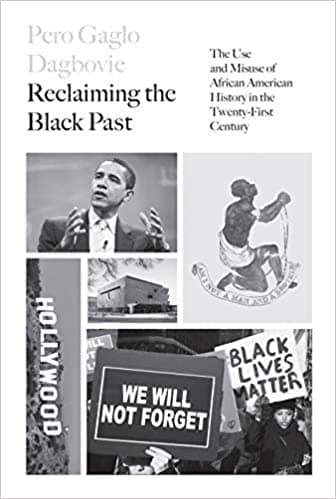Reclaiming the Black Past by Pero G Dagbovie Review

Amazon
Reclaiming the Black Past: The Use and Misuse of African American History in the 21st Century past Dagbovie Pero focuses on the extent to which people in the 21st century sympathize the past history. Dagbovie emphasizes on how the public has become dependent on institutions and not-bookish individuals' regarding knowledge on black history. The book outlines how in the twenty first century, African American history was perceived past diverse people. This includes curators, filmmakers, bloggers, musicians, politicians and journalists. Each chapter of the volume shows a representation of the black history. The book expands on how readers comprehend African American history in the new millennium. Thus Dagbovie insists on "reclaiming" Blackness past in order to expand ho individuals understand the African American history.
Important Aspects of the Book
"Reclaiming the Black By" likewise shows how public figures and trained historians influence the public on Black history. Dagbovie believe that influencers and public figures make reasonable impression on the state's citizens. Real and unique examples are given to support statements fabricated throughout the volume. The volume has five chapters each with enough number of pages. The first affiliate explains how President Barack Obama interpreted, sampled and displayed African history. Dagbovie notes that tactics used past the former president have been ignored in today's societal setting. The author first elaborates Obama as a history maker and role the media took in giving of news and details nigh African history. According to Dagbovie, "Sogrue dubbed Obama "the nation'southward most influential historian of race and civil rights." Wearin the lid of a biographer, Sugrue charts how Obama's keen appreciation and interpretation of race, African American history and black freedom struggle transformed his childhood…" (vi). Dagbovie links Obama's unique interpretation of the African history and his childhood and how it shaped his overall leadership term.
The second chapter two, Dagbovie completes Obama's strategic interpretation of black history. This chapter discusses the debates that have been going on the black History month and its relevance. Dagbovie argues from both indicate of view. In the second chapter, he gives both the back up and criticism of having a Black History month. Dagbovie supports the Black Futures Month, which focuses on presenting current forms of history amount African American suitable to promote future African history. Affiliate three analyzes commercial films that display black feel. Dagbovie critiques "The Help" a film aired in 2011 that explores the dangers of sexual assaults and other form for harassments that are experienced by African American domestic helps. In the end of the affiliate, Dogbovie asserts that "Those who teach American and African American history must be enlightened of how the U.s.a. motion movie industry interprets the past because . . . many of their students will shape what they think they know well-nigh the past based upon these portrayals" (p. 113). It is important that Dogbovie mentions this every bit it matters how the past is portrayed or presented. Films demand to check their interpretations' of certain themes which they release.
Chapter 4 mentions black comedians tell black history. Dagbovie mentions and commends Paul Mooney for stating how African Americans overcame varied forms of oppression. This is a nice perspective that individuals need to know. Information technology also creates a skillful basis and prepares individuals for the Black Futures History. In the last chapter, Dagbovie explores mistakes done by African Americans and how they have been explained by politicians and the United Sates government. For instance, apologizing for doing slavery and segregation makes both parties announced guilty. The five chapters of the book comprehend a variety of topics and concepts. Dagbovie begins with leadership, then the Blackness History week, films, comedians and politics. All chapters have adequate examples to support the claims given. The volume uses unproblematic word with good spacing in betwixt words. Dagbovie clearly explains how Blackness History is all over and non invincible in the United States. This book shows how fighting by past leaders has uniquely shaped the future.
Conclusion
Dagbovie adequately provides an accessible look at Black American history from the 21st century perspective. The volume identified avenues that back history has been advanced. The volume successfully manages between cultural politics and intellectual idea. The book too offers a perfect residue of insider perspective and is sensitive on how laypeople approach the Black History topic. Dagbovie provides a model that can exist used to think about Blackness History in a public and contemporary context. If one has read "A Promised Land" by Barack Obama may detect Reclaiming the Black Past: The Employ and Misuse of African American History in the 21st Century by Dagbovie Pero interesting. Both books show former president's political career and the forces that are at that place in the country and how divisions can be healed. I would requite the book four out of five stars. The volume was arguable, presented arguments from both sides, nevertheless, Dafgbovie should accept includes on way forward or things that could be implemented to ensure Black History did non go extinct.
Scroll to Continue
Work Cited
Dagbovie, Pero G. Reclaiming the Black Past: The Use and Misuse of African American History in the 21st Century. Verso Books, 2018.
Source: https://discover.hubpages.com/literature/Book-Review-of-Reclaiming-the-Black-Past-The-Use-and-Misuse-of-African-American-History-in-the-21st-Century
0 Response to "Reclaiming the Black Past by Pero G Dagbovie Review"
Post a Comment